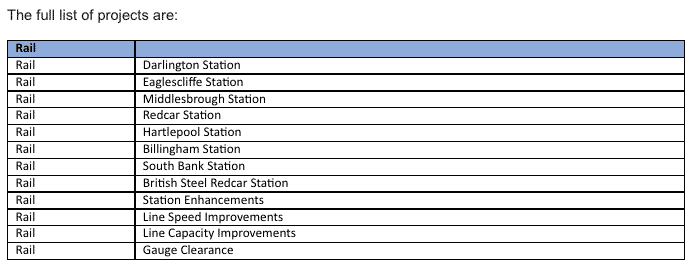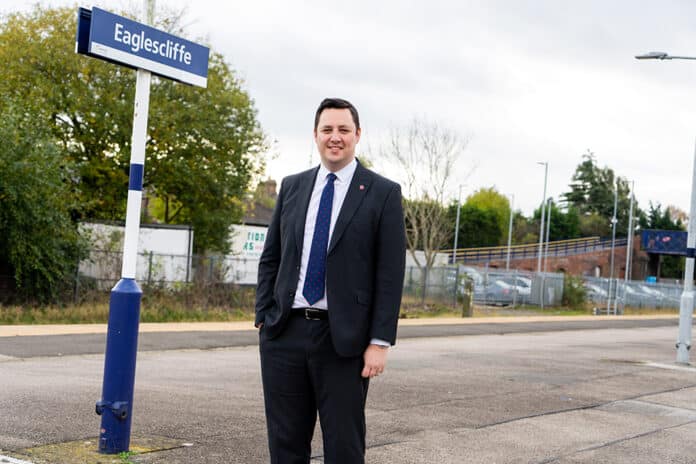The Transport Secretary has written to metro mayors confirming the allocated funding they will receive from the City Region Sustainable Transport Settlement (CRSTS) programme.
As stated in the 2021 Spending Review, the government is investing billions of pounds in the transport networks of 8 city regions across England from 2022 to 2027.
This funding will be delivered through multi-year, consolidated transport settlements agreed with central government and based on plans put forward by city regions.
The letters to metro mayors confirm settlements for the seven city regions currently eligible for a share of the £5.7 billion CRSTS
The eligible regions are:
- Greater Manchester
- Liverpool City Region
- South Yorkshire
- Tees Valley
- West of England
- West Midlands
- West Yorkshire
The North East will be eligible to work with government to agree a funding settlement from the CRSTS programme once appropriate governance arrangements are in place.
You can read the letters here.
Full £1.3 billion West Midlands transport investment programme confirmed
The Department for Transport (DfT) has today confirmed a £1.05 billion grant to transform road, bus, rail, tram, cycling and walking infrastructure across to the West Midlands.
The City Region Sustainable Transport Settlement (CRSTS) money, topped up with local funding, will deliver £1.3 billion investment over the next five years.
West Midlands Combined Authority (WMCA) leaders have already drawn up a priority list of schemes to drive the decarbonisation of transport, target investment into areas of poor connectivity and support inclusive economic growth.
The programme has been developed by Transport for West Midlands (TfWM), which is part of the WMCA, in close partnership with local councils.
Last month the WMCA Board gave the green light to the first four projects. Today’s funding confirmation means work on these can now start. The projects are:
- £24 million to seek sites for, plan and deliver a network of 10 electric vehicle charging stations across the West Midlands
- £43 million to extend the West Midlands Metro depot at Wednesbury to service the region’s growing tram fleet and network – including the extension to Dudley in 2024.
- £17 million to replace and upgrade the Metro power supply on the existing Wolverhampton to Birmingham line for the first time since it opened 22 years ago.
- £56 million to deliver phase two of the Sprint bus priority corridor with more bus lanes and junction upgrades along the full route between Solihull and Walsall. Phase one along the A34 and A45 in Birmingham is nearing completion.
The grant includes funding for the development of new bus lanes and priority routes. Around £254 million will go directly towards schemes which enable active travel, the collective name for cycling and walking.
The DfT also confirmed today that it has earmarked additional funding of up to £87.9 million towards the further development of the region’s Bus Service Improvement Plan (BSIP).
Anne Shaw, executive director of TfWM, said: “This is the largest single investment in our transport infrastructure and will deliver a wide range of projects across our region including bus priority routes, railway stations, safe cycle routes and electric vehicle charging facilities.
“We have, with our local authority partners and backed by Government, developed an investment programme which will support our targets of delivering a green transport revolution, to better connect our communities and support new jobs and housing.”
Tees Valley Mayor reveals schemes to benefit from £310 million transport fund
Tees Valley Mayor Ben Houchen has outlined a raft of transformative transport projects across the region that will be funded through the £310million secured from the government to invest in local transport priorities.
Stations across every borough will receive a share of £86.5million, with investments in Darlington, Eaglescliffe, Middlesbrough, Redcar, and Billingham. The two stations at Teesworks – South Bank and British Steel Redcar – will also be enhanced, as will the transport links to access them.
This is in addition to line speed and capacity improvements, as well as part-funding to resolve issues between Eaglescliffe and Northallerton, where low bridges and tunnels restrict the size of freight on the line.
The Bus network is set to get a £40million boost, with work to improve nine key corridors, providing better connectivity between the region’s main town centres, residential and employment areas, with extra funding to revamp the region’s bus shelters. This includes enhancing links between Middlesbrough town centre and Ingleby Barwick and Coulby Newham, Darlington town centre with Cockerton and the Red Hall area plus Middlesbrough to Redcar town centre and onwards to East Cleveland.
There will be further investment in the region’s roads, with £82.9million passed on to Local Highways Authorities to help them address local priorities, including highways maintenance, including fixing potholes, and small-scale road improvements.
Active travel routes to facilitate walking and cycling will benefit from £46.2million, with 12 such routes across all five boroughs earmarked for upgrades, including Redcar town centre to Teesworks, Yarm Road to Teesside International Airport’s in-development £200million business park and Thornaby to Stockton town centre. On top of that, the current network of Active Travel Hubs will be expanded to support the public and make it easier and safer for people to take advantage of the new and existing walking and cycling infrastructure.
For those people who don’t own a vehicle or aren’t close to public transport links, £3.5million will be invested to continue the region’s Wheels 2 Work scheme – which gives people access to electric bikes to help them get to and from work – and also the Tees Flex on-demand bus service, so no one is left behind.
The funding won’t just make it easier, faster and smoother than ever to get to, from and around the Tees Valley, it will also be used to ramp up our work as a hydrogen and low carbon powerhouse for the UK. A total of £31million will support the rollout of hydrogen vehicles, as part of our status as the UK’s first Hydrogen Transport Hub, and £2million backing the transition to electric vehicles in the region.
A move to digitalisation will also see significant funding used for smart city technology, helping to make the road network more efficient and responsive, and improve customer information. Technology to enable real-time responses such as changing traffic light timings would minimise delays due to planned large-scale events like football matches, or unforeseen circumstances such as traffic accidents.
Mayor Houchen said: “In October we were able to secure £310million from the government, the biggest ever pot of money secured for local transport priorities. The sweeping investments will touch on every corner of Teesside, Darlington and Hartlepool and mean local people have the good-quality transport they rightfully deserve.
“The funding will support everything from huge, transformative schemes such as Darlington and Middlesbrough’s station upgrades to smaller but no less important developments like better bus shelters and cash to maintain roads.
“With 2022 our year of construction, work is ramping up on the Teesworks site, and it’s vital that we invest in the infrastructure there now so that it has the best transport links possible and the workers of the future, no matter how they travel, aren’t left behind.
“As we continue to pioneer the cleaner, safer and healthier industries of the future this money too will help drive forward alternative, low-carbon fuel vehicles, and also help people to make more journeys on foot or on their bikes.
“When taken together, these schemes will go a long way in futureproofing our transport network and give local people the fast, reliable, safe services that they deserve and have been crying out for.”

Photo credit: Tees Valley Combined Authority







































 0113 2082620
0113 2082620 info@railbusinessdaily.com
info@railbusinessdaily.com 15 Mariner Court, Wakefield WF4 3FL
15 Mariner Court, Wakefield WF4 3FL

